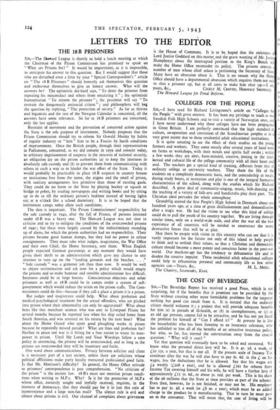THE 18 B PRISONERS
LETTERS TO THE EDITOR
Snt,—The Howard League is shortly to hold a lunch meeting at which the Chairman of the Prison Commission has promised to speak on " What are Prisons for? " It would be impertinent, as it is impossible, to anticipate has answer to this question. But I would suggest that those who are disturbed even a little by your " Special Correspondent's " article on " The 18 B Prisoners" should honestly ask themselves this question and endeavour themselves to give an honest answer. What will the answers be? The optimistic die-hard says, " To deter the prisoner from repeating his misconduct and others from emulating it " ; the optimistic humanitarian " To reform the prisoner " ; the pessimist will say " To restrain the dangerously antisocial citizen " ; and philosophers will beg the question by replying, " The protection of society." As far as thieves and bigamists and the rest of the Newgate Calendar is concerned, all the answers have some relevance. So far as 18 B prisoners are concerned, only the last applies. Restraint of movement and the prevention of concerted action against the State is the sole purpose of internment. Nobody proposes that the Prison Commission should try to reform Sir Oswald Mosley by habits of regular industry or " lam " him to be a Fascist by harsh conditions of imprisonment. Once the British people, through their representatives in Parliament, consented, as we did consent in 1939 and consent today, to arbitrary imprisonment of suspects in the interests of national security, an obligation lay on the prison authorities (a) to keep the internees in absolutely safe custody and (12) to prevent them from communicating with others in such a way as to hinder the war effort of the State. Today it would probably be practicable to place 18 B suspects in country houses or institutions free from the name, the stigma and the smell of prison, with sanitary arrangements less primitive than those of existing gaols. They could do no harm to the State by playing hockey or squash or bridge or poker, by reading newspapers and writing books and by sitting up to do so till the ordinary person's bedtime instead of having lights out at 9 o'clock like a school dormitory. It is to be hoped that the internment camps today allow such conditions.
The date is important. The Prison Commissioners' responsibility for the safe custody in 1940, after the fall of France, of persons interned under a B was a heavy one. The Howard League was not slow to criticise and to try to mitigate the conditions of the overcrowded prisons of 1940 ; but these were largely caused by the indiscriminate rounding up of aliens, for which the prison authorities had no responsibility. Their prisons became great human dumps, but they had no power to refuse consignments. They must take what judges, magistrates, the War Office and their own Chief, the Home Secretary, sent them. When English people expected German paratroops at any moment they would have given short shrift to an administration which gave any chance to any internee to turn up on the " landing grounds and the beaches. . . ." " Safe custody "• was a grimmer job then than now. It would be well to abjure recrimination and ask now for a policy which would empty the prisons and so make humane and sensible administration less difficult. Internees could be in large houses. Conscientious objectors and other prisoners as well as 18 B could be in camps under a system of self- government which would reduce the strain on the prison staffs. The Com- missioners could do this—because if they call a place a prison it is a prison.
But judges and magistrates could help. What about probation and medical-psychological treatment for the sexual offenders, who are pitched into prison where their abnormality can only be aggravated? What about boys like that merchant seaman who was sent to Liverpool Prison for several months because he reported late when his ship sailed home from South America, and was arrested on his return by the next boat? What about the Home Guard who spent good ploughing weeks in prison because he repeatedly missed parade? What are fines and probation for? Neither in peace nor war is it fitting for a free nation to waste its man- power in prison. Until My Lords and Your Worships follow a sane policy in sentencing, the prisons will be overcrowded, and as long as the prisons are overcrowded they will be insanitary and futile.
One word about communications. Privacy between solicitor and client is a necessary part of a just society, unless there are solicitors whose political affiliations make party loyalty transcend professional good faitn. Is that Mr. Morrison's difficulty? In general, the Home Office attitude to prisoners' correspondence is past comprehension. "No criticism of the prison " is the ancient law. IS B's must not mention prison condi- tions when writing to M.P.s. Why? Is it for the protection of M.P.s whose office, earnestly sought and joyfully received, requires, in the interests of democracy, that they should pay for it in just this coin of inconvenience and a large non-fan mail? The silence rule is evil and silence about prisons is evil. Our channel of complaint about grievances is the House of Commons. It is to be hoped that the strictures o Lord Justice Goddard on this matter, and the grave warning of Mr. Justice Humphreys about the intercepted petition to the King's Bench wilt make the Home Office reconsider its policy. The prisons contain number of men whose chief solace is petitioning the Secretary of State. Many have an obsession about it. That is no reason why the Home Office should have a departmental obsession which requires them not only to shut a prisoner up, but at all costs to make him shut up.—I ant,


























 Previous page
Previous page